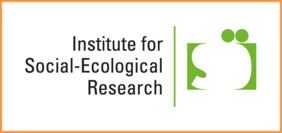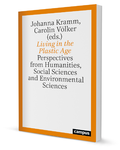Living with synthetic materials in the “plastic age”


Since their invention in the 19th century, plastics have revolutionized almost all areas of daily life due to their versatile properties. However, in the “plastic age”, mass consumption poses far-reaching problems for society and nature. For sustainable solutions, plastics and their risks require a comprehensive understanding, with a holistic view of the path from production to consumption and disposal. Johanna Kramm and Carolin Völker of ISOE – Institute for Social-Ecological Research therefore look at the complex problems involved in dealing with plastics and possible solutions from various disciplinary perspectives in the anthology they edited under the title “Living in the Plastic Age.”
The multiple problems arising by the production and consumption of plastics prompted the United Nations to pass a resolution in May 2022 calling for a legally binding agreement to “end plastic pollution” by the end of 2024. “The UNEA plastics resolution shows that there is finally global recognition that the plastics industry needs to be fundamentally transformed to enable more sustainable use,” says ISOE researcher Johanna Kramm. However, that requires more than just measures to prevent plastic waste from entering the environment, she adds. “It’s about a fundamental change from linear plastic production towards a circular economy and sufficiency,” Kramm says.
This transformation is a complex challenge because it affects the production of plastics and bioplastics as well as global consumption and sustainable consumption patterns. “The necessary transformations in dealing with plastics require cooperation between science and social actors at all levels,” says ISOE researcher Carolin Völker. This idea also underlies the anthology “Living in the Plastic Age,” published by Campus Verlag. “Plastics now permeate all areas of society, polluting ecosystems and nature. That’s why the problems with them need to be looked at from different angles,” the scientists write in the foreword to the English-language compendium, which brings together research results from various disciplines.
Interdisciplinary research results presented in an anthology
“Living in the Plastic Age” includes problem descriptions from political and environmental sciences, psychology, sociology, ecotoxicology environmental sciences and addresses various questions like for instance: How is the European plastics strategy to be evaluated and what public discourses does it trigger? How can a circular economy for waste prevention succeed and what challenges arise from chemicals in plastic packaging in this context? Are behavioral changes part of a sustainable solution in dealing with plastic? How do societal risk perceptions of microplastics match up with scientific evidence on the risks?
The anthology offers different approaches and perspectives on plastics to a broad readership and thus ties in with a lecture series that was organized by the editors in the summer semester of 2019 at Goethe University Frankfurt with international speakers from the humanities, social and natural sciences. From 2016 to 2021 human geographer Johanna Kramm and ecotoxicologist Carolin Völker led the PlastX research group which was funded by the German Federal Ministry of Education and Research (BMBF). The research group established a broad network of plastics researchers and developed an inter- and transdisciplinary approach towards the topic of plastics in the environment as a systemic risk.
Living in the Plastic Age. Perspectives from Humanities, Social Sciences and Environmental Sciences is available as in print and digitally as an open access publication. Review copies for journalists can be ordered from the publisher by email, indicating the medium. Contact: Inga Hoffmann, hoffmann(at)campus.de
Kramm, Johanna/Carolin Völker (Hg.) (2023): Living in the Plastic Age. Perspectives from Humanities, Social Sciences and Environmental Sciences. Frankfurt/New York: Campus Verlag
Introduction: Living in the Plastic Age
Johanna Kramm, Carolin Völker
Explaining Agenda-Setting of the European Plastics Strategy. A Multiple Streams Analysis
Paula Florides, Johanna Kramm
Microplastics in the Aquatic Environment
Maren Heß, Carolin Völker, Nicole Brennholt, Pia Maria Herrling, Henner Hollert, Natascha Ivleva, Jutta Kerpen, Christian Laforsch, Martin Löder, Sabrina Schiwy, Markus Schmitz, Stephan Wagner, Thorsten Hüffer
Risk Perception: The Case of Microplastics. A Discussion of Environmental Risk Perception Focused on the Microplastic Issue
Marcos Felipe-Rodriguez, Gisela Böhm, Rouven Doran
Everyday Life with Plastics: How to Put Environmental Concern into Practice(s)
Immanuel Stieß, Luca Raschewski, Georg Sunderer
Using Citizen Science to Understand Plastic Pollution: Implications for Science and Participants
Marine Isabel Severin, Alexander Hooyberg, Gert Everaert, Ana Isabel Catarino
Behavior Change as Part of the Solution for Plastic Pollution
Maja Grünzner, Sabine Pahl
Chemicals in Plastics: Risk Assessment, Human Health Consequences, and Regulation
Jane Muncke, Lisa Zimmermann
Circularity in the Plastic Age: Policymaking and Industry Action in the European Union
Sandra Eckert
Plastivores and the Persistence of Synthetic Futures
Kim De Wolff
Scientific contact:
Dr. Johanna Kramm
Tel. +49 69 707 6919-16
kramm(at)isoe.de
PD Dr. Carolin Völker
Tel. +49 69 707 6919-59
voelker(at)isoe.de
Pressekontakt:
Melanie Neugart
Tel. +49 69 707 6919-51
neugart(at)isoe.de
www.isoe.de
